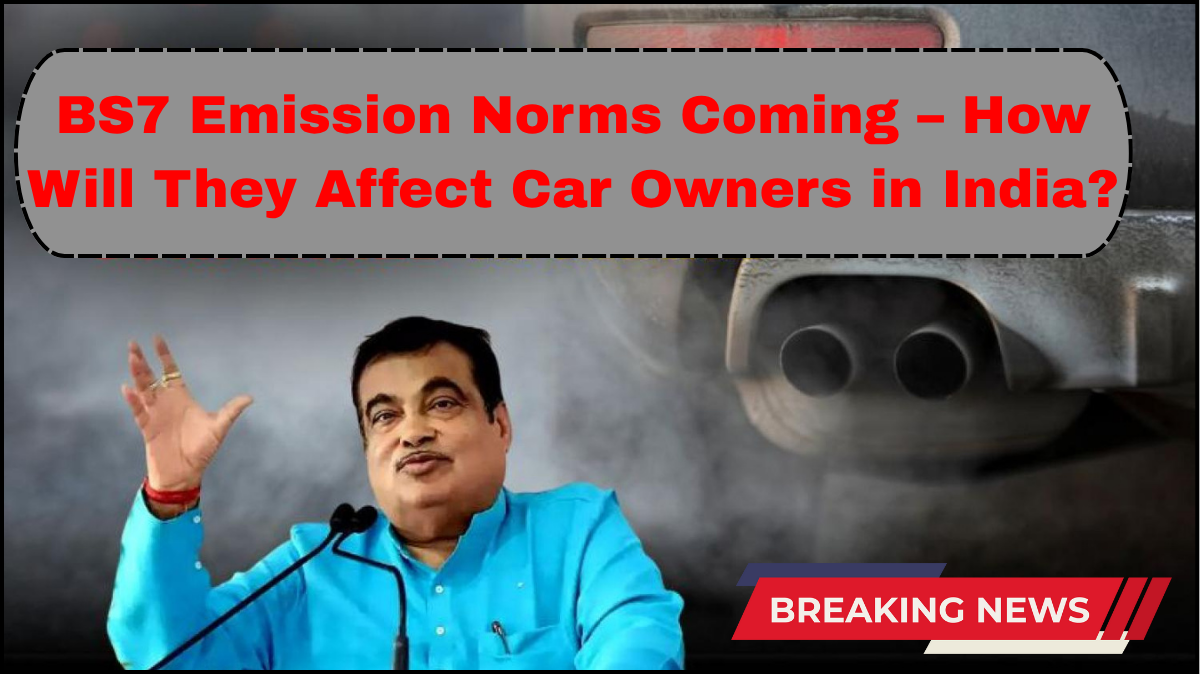India is on the path to enforcing stricter environmental regulations, and the introduction of New BS7 emission norms in India marks a major leap toward reducing vehicular pollution. Following the BS6 standards that came into force in April 2020, BS7 norms are expected to tighten emission limits further, impacting both manufacturers and car owners.
This article breaks down what BS7 means, the expected timeline, how it affects you as a vehicle owner, and what changes you might see on the road and at the showroom.

What Are BS7 Emission Norms?
BS7 refers to the Bharat Stage 7 emission standards, the next phase of India’s emissions control framework. Modeled after European emission norms (Euro 7), BS7 is designed to significantly reduce pollutants like nitrogen oxides (NOx), hydrocarbons, carbon monoxide (CO), and particulate matter (PM) from vehicle exhausts.
The key difference from BS6 lies in the stricter limits, particularly for NOx and PM emissions, and the mandatory use of onboard diagnostic (OBD) systems that constantly monitor real-time emission levels. These systems will become more advanced and will be able to detect even minor deviations in emissions performance.
Vehicle Compliance Deadline and Implementation Timeline
As of now, the government has not officially confirmed the exact rollout date, but the vehicle compliance deadline for BS7 norms is expected around 2027, giving automakers time to transition.
This extended lead time is crucial because BS7 norms will likely require new engine designs, better fuel injection systems, and improved exhaust after-treatment technologies, especially for diesel vehicles.
Car owners need to keep this deadline in mind, especially if planning to buy a new vehicle within the next couple of years. Models launched just before the deadline might become non-compliant quickly, potentially affecting their resale value and eligibility for registration renewals in the long term.
How Will BS7 Norms Impact Car Owners?
1. Cost of New Vehicles Will Increase
BS7-compliant vehicles will require advanced technology – such as better catalytic converters, diesel particulate filters (DPFs), and real-time emission sensors. As a result, expect vehicle prices to rise, particularly in diesel and high-performance petrol segments.
2. Fuel Standard May Be Upgraded
Stricter emission norms usually demand higher-quality fuel. While BS6 already mandated ultra-low sulfur fuel, the fuel standard may be further improved under BS7 to support the precision required by new engine systems. This could mean cleaner fuel but possibly at a higher cost per liter.
3. Aftermarket Modifications and Retrofitting May Be Limited
BS7 is expected to make it difficult to retrofit older vehicles due to advanced integrated systems. Owners of older BS4 or early BS6 vehicles might face regulatory limitations, especially in urban centers with strict environmental enforcement.
4. Stricter Fitness Tests for Older Vehicles
With BS7, expect stricter fitness certification and emission testing norms for older cars. The government is also likely to expand scrappage incentives to phase out non-compliant vehicles more aggressively.
5. Better Long-Term Fuel Efficiency and Environmental Benefits
On the upside, vehicles will become more fuel-efficient and environmentally friendly, thanks to optimized combustion and emission control technologies. Urban air quality is expected to improve, especially in cities battling severe pollution.
Industry and Market Implications
Automakers will have to invest heavily in R&D and revamp their engine lines. Small players may exit the internal combustion market or shift focus to electric vehicles (EVs). In fact, BS7 might accelerate India’s EV transition as a more cost-effective compliance strategy.
Also, hybrid and plug-in hybrid vehicles are expected to gain traction, offering a balance between compliance and performance.
What Should Car Owners Do Now?
-
Plan Purchases Wisely: If you’re buying a car soon, consider future compliance and resale potential.
-
Maintain Vehicles Properly: A well-maintained vehicle is less likely to breach emission limits even as standards tighten.
-
Watch for Government Announcements: Keep an eye on the finalized vehicle compliance deadline and any scrappage policy updates.
Frequently Asked Questions (FAQs)
Q1: When will BS7 norms come into effect in India?
A: The BS7 norms are expected to be implemented around 2027, although no official date has been confirmed by the government yet.
Q2: Will my current BS6 vehicle be banned?
A: Not immediately. BS6 vehicles will remain legal, but may face restrictions or higher taxes in pollution-sensitive zones after BS7 norms are enforced.
Q3: Will fuel prices increase due to BS7?
A: Possibly. A more refined fuel standard might be required, which could lead to marginal fuel price hikes.
Q4: Are electric vehicles affected by BS7 norms?
A: No. EVs don’t emit exhaust gases and are not subject to BS emission norms, but their adoption might increase as a result of stricter BS7 regulations.
Q5: Can older cars be upgraded to meet BS7 norms?
A: It’s highly unlikely due to the complexity and cost of upgrading older engines to meet BS7 standards.
click here to learn more